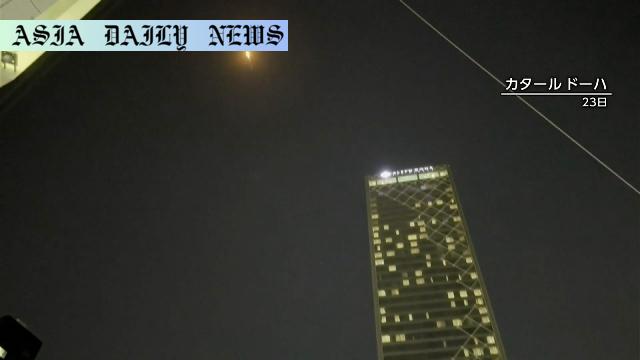Iran-US Conflict: Six Iranian missiles target Al Udeid Air Base in Qatar, following US strikes on Iranian nuclear sites.
Iran launched an attack on the US’s Al Udeid Air Base in Qatar with six missiles.
The strikes are in retaliation to US attacks on three Iranian nuclear facilities.
No casualties reported; Qatar intercepted missiles and minimized damages.
The US warned of further action if Iran retaliates, escalating tensions.

Overview of the Iran-US Military Escalation
On Monday, Iran launched an aggressive military operation targeting the Al Udeid Air Base near Doha, Qatar. This bold retaliation follows a sequence of US-initiated airstrikes against Iranian nuclear sites. The Iranian military confirmed deploying six missiles during the operation, which aimed to symbolically respond to bombings carried out by the United States.
Al Udeid, the largest US military base in the Middle East, has become a flashpoint in the ongoing geopolitical rivalry between Washington and Tehran. While Iran claimed the attack as a defensive measure against US violations of international law, Qatar’s air defense systems successfully intercepted the missiles. Fortunately, no injuries or fatalities were reported, minimizing the immediate human cost of the strike. The calculated advance notice issued to Qatari officials by Iran reflects an intent to minimize civilian or unintended collateral damage.
US-Iran Tensions and Geopolitical Repercussions
The conflict stems from heightened hostility over Iran’s nuclear program. The controversial US strikes on Sunday targeted three Iranian nuclear facilities. With President Trump’s administration citing concerns over Iran’s growing nuclear capabilities, the strikes were presented as a step necessary to dismantle perceived threats. This unilateral action has amplified existing tensions, with both nations now locked in a precarious tit-for-tat dynamic.
Iran has openly condemned the US strikes as flagrant violations of international law and a provocation against its sovereignty. In turn, US officials are maintaining a hardline stance, threatening additional measures should Iran retaliate further. Experts fear the continuation of such military escalations could potentially destabilize the fragile equilibrium across the Middle East, pulling the broader international community into its vortex.
Qatar’s Role and the Global Strategic Implications
Qatar, an ally of both the United States and neighboring Middle Eastern states, finds itself in an unenviable diplomatic position. As host to the US military’s largest Middle East installation, Qatar plays a pivotal role in the operational logistics of US defense strategies. However, its geographical and political proximity to Iran renders it vulnerable to being caught in the crossfire of these increasing hostilities.
The intercepted attack highlights Qatar’s growing investment in advanced air defense systems and strategic preparedness. While no casualties occurred in this instance, the incident underscores the perilous environment in which regional nations operate, where strategic alliances fail to guarantee immunity from external threats.
The Road Ahead for Global Diplomacy
The Iran-US conflict is an alarming reminder of the volatile unpredictability in international relations. The reciprocal aggression threatens to dangerously escalate into open warfare, risking the destabilization of not only the Middle East but also global peace. Diplomatic engagement and international mediation are more critical than ever to de-escalate the crisis.
In conclusion, the recent developments reflect the precarious landscape of modern geopolitics. Preventative diplomacy must take precedence over military shows of strength if global players hope to prevent further bloodshed and chaos.
Commentary
Iran’s Calculated Response to US Provocations
The latest events unfolding between Iran and the US speak volumes about the delicate balance of power in the Middle East. By targeting the Al Udeid Air Base, Iran has demonstrated its willingness to retaliate, albeit measuredly, against perceived injustices. This calculated missile strike carefully avoided urban areas and spared human casualties – a move that not only signals Iran’s restraint but also its understanding of the broader geopolitical consequences of excessively aggressive actions.
The Global Stakes and Risk of Escalation
At the heart of this conflict is a precarious game of brinkmanship. Both Washington and Tehran are aware that global eyes are closely monitoring their actions. Any miscalculation, such as an escalation involving casualties or civilian harm, could trigger catastrophic consequences stretching beyond their borders. Furthermore, as other nations align with or against the involved parties, the risk of a multi-national confrontation becomes an alarming possibility.
The Role of Diplomacy in Diffusing the Crisis
This incident underscores the urgent necessity of diplomacy. While the US cites the neutralization of nuclear threats as justification for its assaults, unilateral military operations come with an inevitable cost. Iran’s symbolic retaliation, too, serves as a reminder that no action goes unnoticed or unanswered. Negotiated frameworks, such as reviving the Joint Comprehensive Plan of Action (JCPOA), appear increasingly essential to stem the tide of violence. Without such measures, neither side can extricate itself from a seemingly endless cycle of provocation and retribution.
In this mounting crisis, the international community must assume a proactive role as a mediator. Stabilizing this volatile region requires thoughtful, coordinated efforts that prioritize peace over politics.


